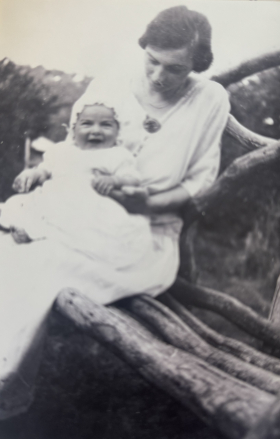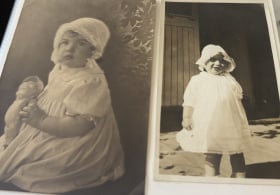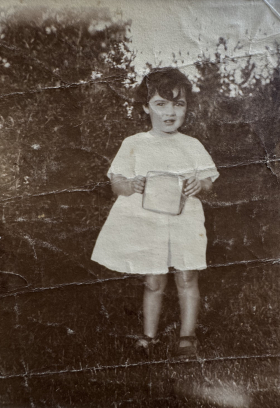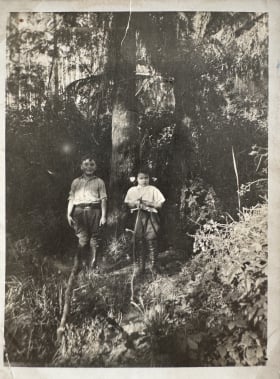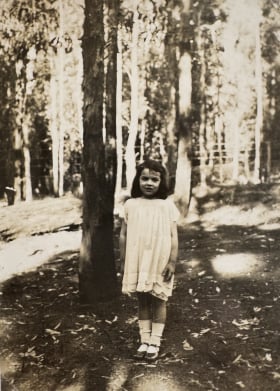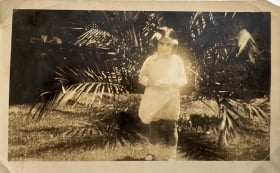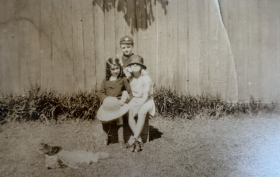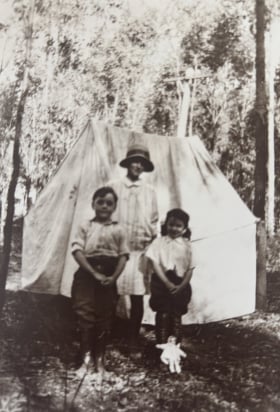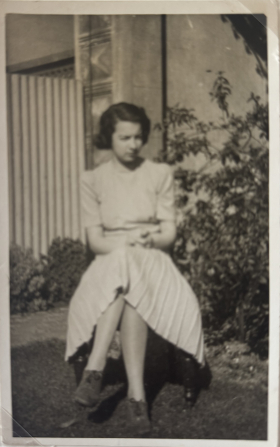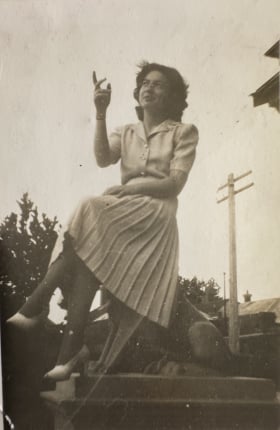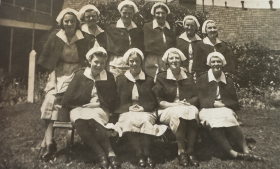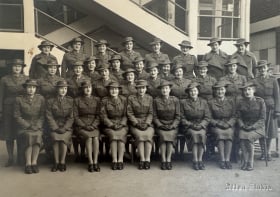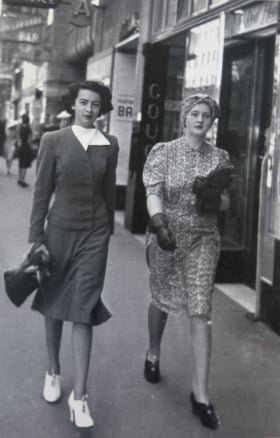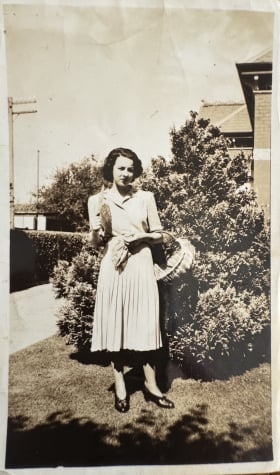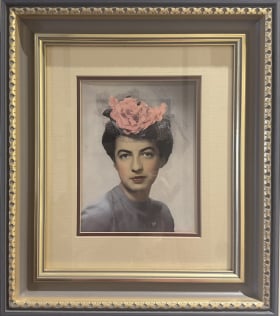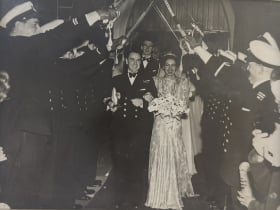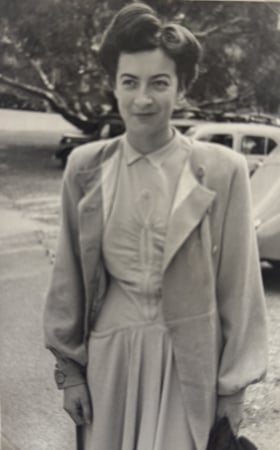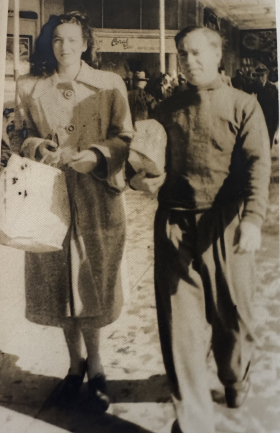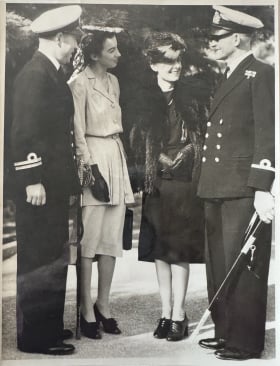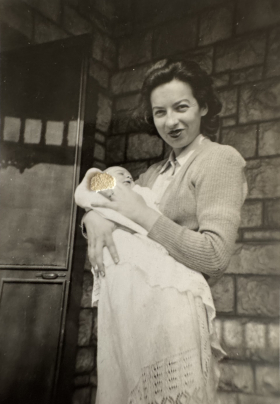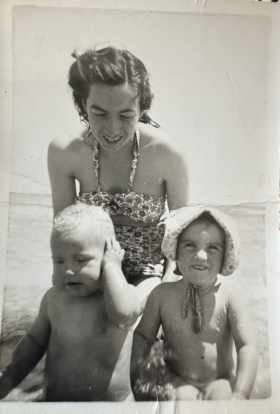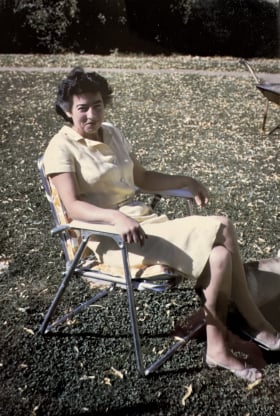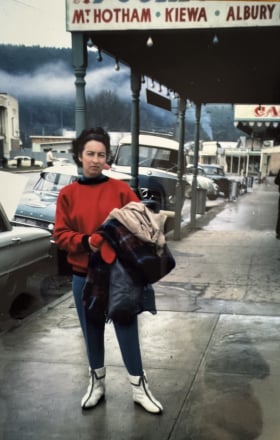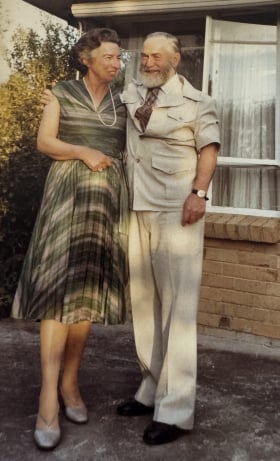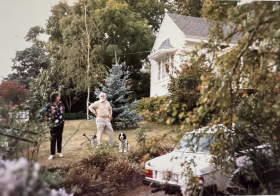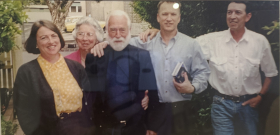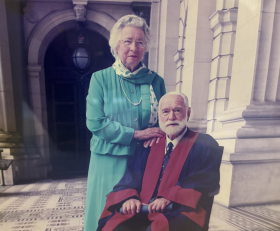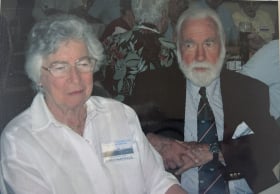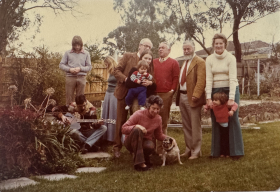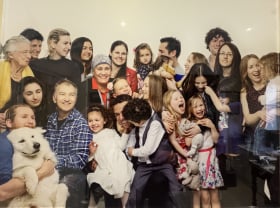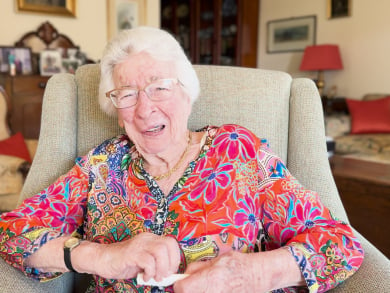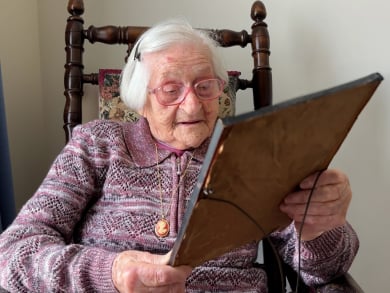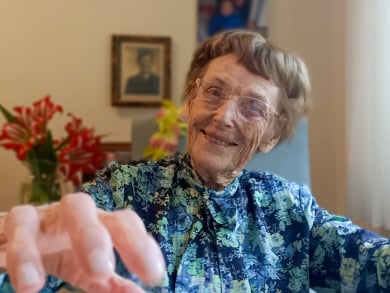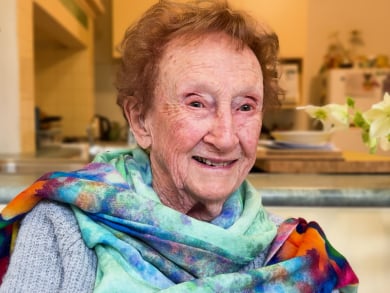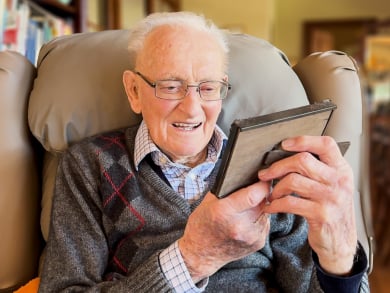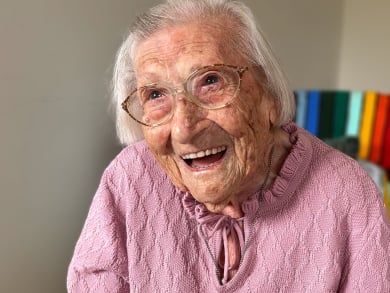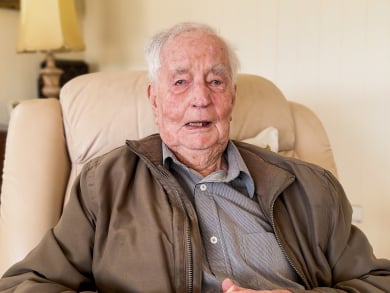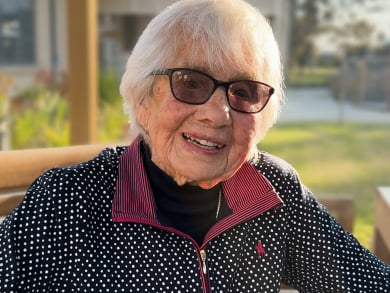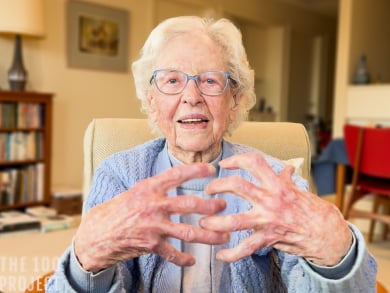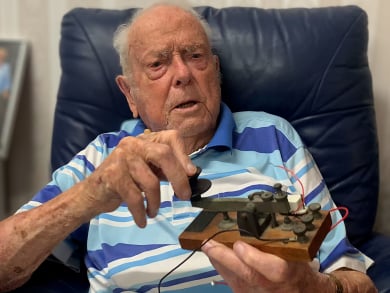What are you most proud of in your life?
I think just my family.
They’re such a big mixed up mob.
Half the nationalities in the world.
Very interesting to see what happens
with your families.
My name is Janet McDonald.
Born at Melbourne.
That is me in 1923 taken with my mother.
She nearly died when I was born.
My grandmother went to visit her and me
the day after I was born.
And the matron at the little hospital
in Murrumbeena
said, “Oh, you can't go in.
She's got measles”.
My grandmother said,
“I don't like the sound.
I'm going in.”
Because she had done some nursing and
drove ambulances in France during the war.
She'd seen septicemia
and knew the septicemia rash.
Straight away got an ambulance
and they took her into
"Mount Saint Evin’s,
which is St Vincents now."
She was there for months.
"Couldn't have any more children
after that."
My father was an accountant.
But he was very troubled
from his experiences during the war.
It’s the 5th Battalion Pipe Band.
Oh, I've always loved the pipes.
He left in the first ship
that left Australia in 1915.
They went straight to Egypt,
and then they went to Gallipoli,
landed on the second day of the
Headquarters Company.
I think moved around a bit, you know,
as the war progressed.
He was not well.
He came back, he’d go off on benders
occasionally...
Vanish for a week and lose a job and
come back and settle down again.
But
I think he had very hard time
for quite a long time.
My mother seemed to be
remarkably understanding.
He used to go and play for the
Blinded Soldiers Association
between the two world wars.
He frequently played
the piano up there on Friday nights.
20, 30, 40 men sometimes.
As a teenager, I'd be
sent to dance with them occasionally.
I was always a flat-footed dancer.
Wasn't much help to them I suspect,
but they were a nice lot of men.
Some even had their voice boxes
burnt out from the mustard gas.
And I remember one man, Foster McConnell.
Lovely bloke.
He could just speak like that.
Awful to listen to.
So sad.
That's Betty.
"My mother’s mother
was a wonderful storyteller"
when we were young.
I remember one day
she had those coloured glass
windows in the drawing room,
the top of the big bay window,
and in the late afternoon
you’d get those
lights in the air.
And she used to always tell me they were
the fairies flying across the room.
Come to see us.
Come to visit us.
We were living in
Armadale.
And one side of the street
were quite nice,
you know, three, four bedroom houses.
The other side
were these two bedroom terraces.
And there was one house there
where there were
at least seven children
that I can think of.
And I was walking past the house one day
and I stopped to talk to one
of the girls about my age,
and the mother came up
and gave her a piece of cake.
And she said to me, would I like a piece?
I said, “Thank you very much”.
I had one mouthful of it
and it had been made,
I showed it to my mother,
been made with rancid dripping.
I’ve never forgotten.
It just sort of sticks in your mind.
It was just horrible.
11 Cromwell Road, South Yarra.
I sort of grew up there.
And I got to know
most of the old dears on the street.
And there were 2 or 3 dear old souls.
Spinsters
living in these big old two-storey houses
in the street.
I suppose,
left over from the First World War.
Husbands or
boyfriends
killed.
The first school I went to
was it a little boarding school.
Madam Pignolet and her two daughters.
Madam Pignolet was a bit of hard taskmaster.
Liked to use her
round pencil on your fingers
when you were having your piano lesson.
That was common in those days.
Then I went to Saint Margarets
in Malvern.
Then I had 2 or 3 years
when I was virtually home
most of the time.
I ended up
getting blood poisoning and appendicitis.
Then I got rheumatic fever.
But I was always happy as long as
I had a plentiful supply of books.
And I still enjoy reading.
Dickens.
‘The Old Curiosity Shop’.
I've always loved that.
Bronte. Poetry.
Jane Austen.
And I even still sit down
and read a bit of Shakespeare.
Once I started to come good,
they sent me to Firbank as a boarder.
I was so far behind with my work.
Especially maths and science was useless.
I couldn't catch up.
Just end up in strife all the time.
Oddly enough,
I've got a couple of frocks at the moment
that would be exactly what I was wearing,
couple of sizes bigger, at 18.
Plain shirt frocks.
Very comfortable easy fashion.
I had done eight months nursing.
I can still remember
giving my first injection
to one of the patients there,
having only practiced on an orange
up until that stage.
And she was a girl about 16
who’d had a leg amputation.
TB bones, which we don't see anymore.
And I was about 18 months
older than she was and terrified.
Frightened I was going to hurt her
whereas she just thought it was funny.
Nice girl.
Came from the
slums of Melbourne.
God, she was brave.
Wonder how she got on
for the rest of her life.
It was awful.
I hated it.
Hours were too long.
You were so isolated out there.
I just didn't fit, I think.
I hated night duty.
You'd be sent from one ward
to another in the dark
and we were using
lanterns which we had to keep shaded.
Male patients, especially the TB patients,
could be a worry at night.
They'd go wandering.
The girls all warned each other
to be careful.
It was blackout days
and you had to be very, very careful
with your lamps that you didn't
have any light shining through the gaps
in the canvas.
Melbourne was just dark.
Can you imagine it
without any of that
reflected street lighting?
Even a country town
these days has streetlights in it.
I don't like the idea of starting a war
but if you have no choice,
you do what you can.
My father was in the army.
Everyone else was in the services
by that stage.
You had to do something.
You couldn't just sit at home
any longer.
I don’t know, for some reason,
they stuck me in medical records
and there I stayed
for the rest of the war.
Fortunately, the office was at
339 Swanston Street
so I had the public library
over the road.
And the gallery.
I could go and say hello to Phar Lap.
A photo of me with my friend
Elizabeth Wallace
"outside the Australia
in Collins Street, Melbourne."
"That was probably
the only outfit at the time. "
And I was in civvies
which I probably shouldn't have been.
I probably should been in uniform.
So I was committing an offence.
I had a cousin
who went to the Naval College
as a 13 year old
and I got to know
all the boys in his year
which was great fun.
Eventually married one.
I wasn’t very keen on him
when we were younger.
"There were people
in the year I preferred more."
He was too sensible
and good and hardworking
and....
When I was 13 or 14 I found him boring.
I suppose I grew up a little.
In the middle of the war some time,
we bumped into each other
on Princes Bridge.
And he said,
"“Could you have tea with me
this afternoon?”"
Very proper.
I, for some reason, was going somewhere
and said, “Sorry...”
Then it wasn’t
until the war finished
and I was staying in Hobart with an aunt
and uncle.
The fleet was in for the regatta.
And I thought, I'm sure I know
someone on board something that’s in.
Put the thinking cap on
and came up with
Hugh.
So I rang that ship.
He said,
“Oh, we've got a ball on tonight.
Do you want to come?”
I had terrible trouble, though.
I'd taken an evening frock away with me
"because it was getting
to that stage again."
And I didn't have any long white gloves.
I chased every shop
in Hobart.
Eventually, I found one pair that
went on my arm
but I had to leave it rolled up
because the fingers were so small.
So I did manage to
get myself dressed.
Just sort of went from there.
We got married in 46.
Christ Church in South Yarra.
He was very tolerant.
Put up with me.
I got a bit fiery at times.
"I don’t think I’d have been easy
to put up with at times."
Because I don't think you are going to find
any partnership of any sort
"that's not going to have
differences of opinions"
somewhere along the line
and probably very serious ones at times.
Or that appear to be serious to you.
The next day when you’ve had an argument
about something
when you think you might kill each other,
you wonder what you were arguing about.
That happens quite frequently.
Or it has to me.
That is the year
that my husband was at the Naval College.
The rest of his year and there
were 12 boys in my husband’s year
and two of them were killed.
Very attached to all of them.
Pencil drawing of me
when I was about 14 by
one of the young naval cadets,
Jack Lester.
He was unfortunately lost
during the war.
Such a nice, kind boy.
It was just such an enormous relief
to have it over and
to know they were now safe.
There were crowds in the street,
Swanston Street and Collins Street
were just packed.
Yes.
Don't seem to remember
anyone doing any work.
We moved to Adelaide.
"My husband finally managed
to get out of the Navy."
He'd been trying
ever since the war finished.
Housing was absolutely impossible.
Eventually managed to find a single room.
I got pregnant,
made the mistake of telling the landlady
and she instantly gave us notice.
Took us
nearly a month
before we found another room.
And that was in the city actually,
out in the outskirts of Adelaide.
But she was a bit of an old bag
and she didn't like having a baby
in the place.
And, I was only allowed
to use the kitchen for
one hour a day, and
I asked one night if I could
go into the kitchen to get something
I needed for the baby, and she said,
“No, you've had your hour!”
My husband did his block.
Told her exactly what he thought of her.
And then he settled down.
Anyway, in the morning,
she didn't come out of her room.
We got a bit of a fright then.
But by about 10 o’clock in the morning,
I said, “I'm going to knock on the door
and see if she's all right.”
She'd had a stroke.
She eventually spent about six weeks
in hospital and didn't come back.
And
we found out that
the rent we had been paying her
was the whole of the rent
that she'd been paying for the house.
We moved to Cowell,
over on the west coast
of South Australia,
after my husband graduated.
And that was our first practice.
Then 16 years in Kerang
in northern Victoria.
My husband was a GP.
Smallish country town
with four doctors.
Very non-stop for the doctors.
Especially if they're
extremely conscientious people.
We had three children.
That's my husband with my daughter
and the two boys,
Hugh and Hector.
Oh, and me.
Didn’t notice that.
once they were teenagers...
I just loved those years.
They went to the local school
until
high school stage.
Then they were all sent off
to boarding school,
which worked well for my daughter
and didn't work at all well for the boys.
They hated it.
They’d made their friends
up in the country.
They liked the country life.
They got old at riding
those dreadful
old vehicles around dam walls
and doing all those terrible things that kids
do out on farms.
This is my daughter, Georgina,
when she was admitted to the bar.
Got her degree
"the same day as her future
husband got his."
It was lovely to see.
Hector and Hugh,
they both became musicians.
My oldest son basically worked solo.
My youngest son
was with a couple of bands
that were reasonably well known.
The last one was a band called Redgum.
He used to write songs.
He loved what he did.
My daughter...
oh, say 12 years ago...
Losing Georgina...
Breast cancer, Georgina.
It's a horrible thing.
And then my older son
a couple of years after that.
Same year as his father, about
6 or 8 weeks between them.
And...
And my youngest son.
No use people telling you it’s
going to get better.
It doesn’t.
My daughter's husband will be
80 this year.
Seems terrible, doesn’t it?
I can still remember him at university.
Probably 9/10 of the young people
haven’t the vaguest idea of what’s
going on in the world.
They don't listen to the news.
They don't read the newspapers.
I think they’re very easily influenced
by someone who comes along and wants to
influence them.
That’s very worrying.
I think Trump is
just going to kill so many countries.
It’s frightening.
I think it’s the most frightening thing
that’s happened since the day war
broke out in ‘39.
Just like the Nazis back again.
Even here in Australia.
What's wrong with the boys?
How can they be so easily
influenced by these neo Nazis?
Have we spoilt them?
Or is it just that our
education system is so poor that
they don't know
what’s happened in the world?
They need to be teaching the kids
what’s happened in the world
over the last
90 years. 80 or 90 years.
They need history lessons.
Geography lessons.
"Enough to give me
sleepless nights at times."
I went to a naval
thing at the Box Hill RSL last week
and talking to one of the ex-Vietnam men
and he's still in a bad way.
I just don't think people
really understand
now how shocking war can be.
You said your favorite food was crayfish.
Preferably on sheets of newspaper.
Fresh bread and butter and lemon.
Nothing fancy.
And that was one of the beauties
of living in Cowell.
We used to go out
with a bucket and a spear,
which was a broomstick
with a six inch nail on the end of it.
Come back with a baby bath
full of crab.
Cook them on a wood stove
in the backyard.
Do you have any secrets
to longevity?
Well,
not too much exercise
and a good brandy and dry
before dinner every night.
I find that helps...
Or two.
